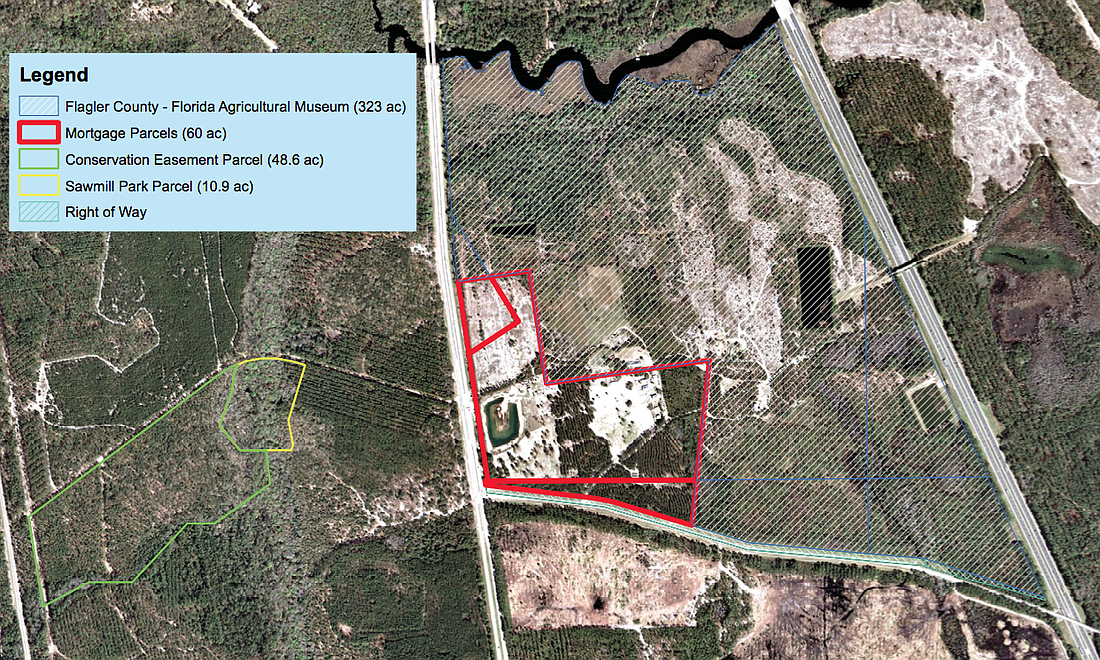- May 2, 2024
-
-
Loading

Loading

Flagler County could get almost 400 acres of Florida Agricultural Museum land in exchange for paying off a mortgage on another Ag Museum parcel and giving the museum a grant of $25,000 for five years.
"We don't want to lose the museum," County Commissioner Nate McLaughlin said at a County Commission workshop Feb. 6. "We don't want them to have to shut it down, or go somewhere else, god forbid. ... Overall, going forward, stabilizing them is good for the county."
The proposed deal is the latest iteration of the county's negotiations with the museum's leadership after the county bailed out the museum last October.
The county at that time agreed to lease the museum to prevent its closure when it was unable to get insurance for its equestrian activities, which provide much of the museum's income stream. The lease with the county allowed the county's insurance to cover the equestrian activities, which would otherwise have had to be shut down, endangering the finances of the museum as a whole.
That symbolic, $1 a month lease approved in October was set to last for 90 days; the County Commission then approved a 60-day extension.
At the time, the county was considering taking over the museum as a county park. As a park, the property would bring in about $190,000 in revenue annually, Coffey told commissioners in an Oct. 20 workshop, but it would take $340,000-$360,000 annually to operate, with much of that money going toward staffing.
That proposal, which made commissioners wary because of its expense, was off the table when the commission met again about the museum Feb. 6.
"This new proposal keeps us out of all that, and limits our exposure," Coffey said. Under the new proposal, the museum's employees would remain museum employees rather than becoming county employees.
Under the new plan, the county would pay off an $185,000 mortgage for a 60-acre parcel of land that contains most of the museum's buildings, provide $25,000 per year (to be matched by the state) for five years in the form of a grant, and take ownership of about 400 acres of Ag Museum land surrounding the 60-acre parcel. The money for the mortgage and the grant would come from Tourism Development Council capital funding.
There would also be some costs associated with taking on the additional 400 acres, which would consists of two parcels, with the largest connecting to the Princess Place Preserve.
"Taking on the 400 acres, I think the costs are going to be minimal," Coffey said. The county may have to add and train one employee to care for the new 400-acre tract and provide services like mowing and road grading, he said, and that could cost, "worst case," $50,000 to $100,000 for basic maintenance. If the land is developed in the future, that would cost more.
McLaughlin — the sole commissioner to vote against the 90-day lease for the Ag Museum in October — was the most vocal supporter of the new proposal when other commissioners challenged it in the workshop Feb. 6.
County Commissioner Donald O'Brien expressed wariness of the deal, but said he supported getting the additional land.
"That's what it's all about," McLaughlin said.
"It's about a lot more than that," O'Brien replied.
Commissioner Dave Sullivan said he thought the project still had a few "loose ends."
"The museum is not a big success," he said. "Is anything we're doing now going to make it a bigger success?"
Coffey replied that the new deal was about acquiring land, not about managing the museum itself.
Commissioner Greg Hansen, like McLaughlin, supported the plan, saying, "My take on it is, let's move forward. ... This is the minimum we can do to give them the opportunity to succeed. ... get some of that debt off their back, give them a solid footing so they don't have to take care of all that land."
County Commissioner Charlie Ericksen felt the proposal was too nebulous and lacking in accountability.
"I haven't heard anything about what we're going to measure, and how we're going to measure success," he said. "I still think we're trying to take this whole thing on as a major plan, and we're talking about adding to it, when we don't even have what we've got under control."
There wasn't a clear resolution on the issue during the Feb. 6 workshop. Any proposed county contract with the museum will have to come before the County Commission again for a vote at a regular board meeting.